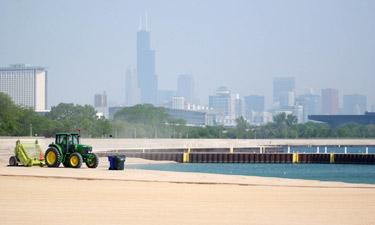 Chicago is known for a lot of things: deep dish pizza, President Obama’s hometown, Buckingham Fountain, blues music…and beaches? Most don’t think of Chicago when they hear the word "beaches." Managed by the Chicago Park District, the 24 designated swim beaches along Chicago’s lakefront are a popular summer destination for most Chicagoans and tourists coming into the city from the Friday before Memorial Day weekend until Labor Day each summer. The Chicago Park District has become an aggressive beach manager over the years and has implemented some beach management practices to ensure the beaches stay safe and clean for the many visitors each and every year.
Chicago is known for a lot of things: deep dish pizza, President Obama’s hometown, Buckingham Fountain, blues music…and beaches? Most don’t think of Chicago when they hear the word "beaches." Managed by the Chicago Park District, the 24 designated swim beaches along Chicago’s lakefront are a popular summer destination for most Chicagoans and tourists coming into the city from the Friday before Memorial Day weekend until Labor Day each summer. The Chicago Park District has become an aggressive beach manager over the years and has implemented some beach management practices to ensure the beaches stay safe and clean for the many visitors each and every year.
“We continuously strive to integrate the latest technology in our efforts to manage and maintain the health of our beaches,” says Michael P. Kelly, Chicago Park District general superintendent and CEO. “With more than 20 million patrons visiting our beaches each summer, we work to provide the most accurate information in a timely fashion, while also searching for ways to keep our beaches healthy for all to enjoy.”
Thanks to grant funding from the Great Lakes Restoration Initiative of the U.S. Environmental Protection Agency (USEPA), the Chicago Park District is on the cutting edge of efforts to monitor and improve water quality at swimming beaches. The Chicago Park District tests for a bacteria called E. coli at all beaches at least five days per week. Although not harmful itself, E. coli is used as an indicator for human health risk. When levels of the bacteria are found to be higher than the federal water quality criteria, the Chicago Park District posts swim advisories at the affected beaches. Unfortunately, the USEPA-approved method for water quality testing comes with a frustrating 18-hour delay for results to come back from the laboratory. This means that prior to 2012, swim advisories were posted based on day-old information. In 2012, Chicago Park District began using a new predictive modeling system that provides real-time information on water quality.
Years of research have shown that beach water quality is strongly correlated with water and weather patterns, such as rainfall, wave height, wind speed, and turbidity (clarity of the water). The Chicago Park District used grant money from USEPA to install weather monitoring equipment at several beaches in 2011. The equipment collected hourly data on these and other weather measurements. During the winter, the Chicago Park District worked with researchers at the U.S. Geological Survey (USGS) to build statistical models using this weather data to predict bacteria levels in the water. A computer program automatically calculates each day’s predicted bacteria level using the most recent weather measurements each morning. The Chicago Park District can now provide the public with more timely and accurate information about water quality than ever before.
The Chicago Park District also used grant money for public outreach about beach water quality. A new texting service was implemented that allows beach goers to text the name of their beach to a dedicated number and receive an automatic response with the current beach conditions. A public education campaign encourages people not to litter or feed wildlife, since waste from seagulls and geese has been shown to be a major source of bacteria in the water. The campaign also includes signage on Chicago public transit, posters at beaches, and a large artistic mural at one of Chicago’s busiest beaches. A new Beach Ambassadors program with direct public outreach asks beach goers not to litter or feed wildlife, and expanded programming for the Chicago Park District’s summer day camp program educates kids on what they can do to keep the water clean.
Finally, the Chicago Park District is working to reduce bacteria sources directly. New grooming equipment removes debris and exposes wet sand to sunlight, killing bacteria. At beaches with a history of problems from seagull waste, the Chicago Park District is using dog handlers and trained border collies to chase the gulls from the beach. This project has significantly reduced the number of days where bacteria levels were above water quality standards. To find out more information about the Chicago Park District’s beach management efforts call 312.742.PLAY (7529).

